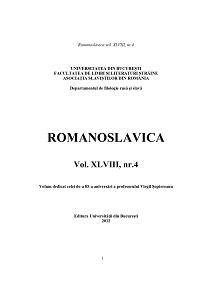Вопросительно-относительные местоимения в современных славянских языках (на материале русского, чешского и болгарского языков)
Interrogative-relative pronouns in modern Slavonic languages (based on Russian, Czech and Bulgarian languages)
Author(s): Petru IstrateSubject(s): Semantics, Comparative Linguistics, Western Slavic Languages, Eastern Slavic Languages, South Slavic Languages, Philology
Published by: Editura Universităţii din Bucureşti
Keywords: interrogative-relative pronouns; contemporary Slavonic languages; grammatical proprieties; semantic classification; pronominal classes;
Summary/Abstract: The interrogative-relative pronouns in the contemporary Slavonic languages, with the exception of who, what (and their respective compounds) and how much / many, can by divided into three classes in contemporary Slavonic languages: masculine, feminine, neuter. In addition, most of them change form just like adjectives do. In conclusion, pronominal classes appear similar to nouns, adjectives and numbers from the point of view of grammatical proprieties, but they differ from them in terms of semantic classification.
Journal: Romanoslavica
- Issue Year: XLVIII/2012
- Issue No: 4
- Page Range: 223-225
- Page Count: 3
- Language: Russian

